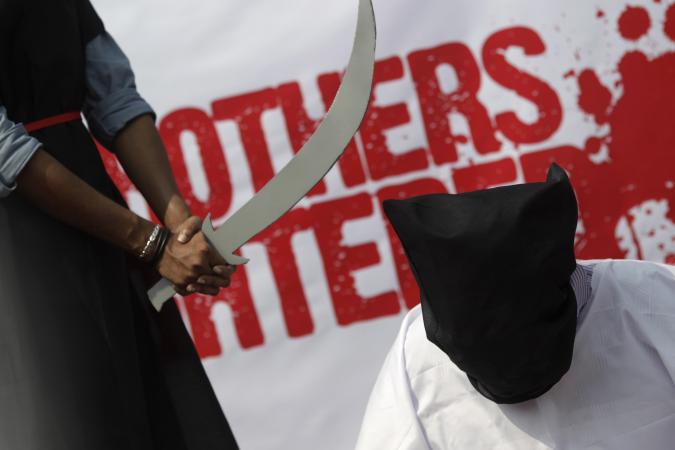
Saudi news media reported that Saudi Arabia determines to perform executions against four prisoners. This news confirms that the execution of 47 prisoners by the Saudi authorities in January 2, 2016, was not just a fleeting violation, but it is a systematic approach, comprising many indications which raise serious concerns over the reality and the future of the human rights in the country.
Media stated that, these executions come as a continuation to the previous execution of 47 people in January 2, 2016.
The charges brought by the media about the four prisoners are: affiliation to terrorist organization, implementing criminal plots, adopting Takfiri ideology and targeting security forces and security installations. However, these charges were reported in non-neutral media. In the light of absenting and the absence of the independent media in Saudi Arabia, relying on the official media reports might lead to delusion, especially that the editors, journalists and writers are suffering from a security control performed by the Interior Ministry through arrests, recruitments, dismissals, threats and investigations. Besides, Saudi Arabia has placed no. 164 among 180 in the Worldwide Press Freedom Index, compiled by Reporters Without Borders.
The reports focused on justifying the coming executions before being undertaken and they pointed out that the sentences of “Qisas” are examined by three judges when they are initially issued by the Specialized Criminal Court (SCC). Then they are transferred to the Specialized Court of Appeal where five judges review the issued sentences, and then they are referred in the third stage to the Supreme Court where another five judges also examine them.
It is obvious that focusing on the number of judges which is 13, intend to reveal that the trial is just, whereas, comparing the nature of trials in Saudi Arabia with the conditions of fair trials, shows that the trials in Saudi Arabia, particularly the security trials which are held in the SCC, do not meet the conditions of a just trial.
Besides, describing the sentence with al-Qisas, indicates that the four concerned detainees had killed someone, and consequently killing them is a similar penalty. However, this was not stated in the charges mentioned in the report. The European Saudi Organization for Human Rights (ESOHR) cannot document their cases since the news did not report their names. In the executions performed in January 2, 2016, the authorities’ media used the term “al-Qisas” for killing individuals who did not kill anyone, and this is considered fraudulent and misleading.
ESOHR analyzed (the role of the lawyer in the security cases where death sentences are issued), after monitoring the insistence of the Saudi government to describe the death sentences of those executed in January 2, 2016 as fair trials. The analysis focused on describing the role of the lawyer, and concluded that his role was totally marginalized and did not belong to the fundamentals of the lawyers’ role; therefore, reiterating the claims about the fair trials is unreasonable.
The media in Saudi Arabia has launched a similar campaign before the execution of the 47 prisoners, and this raises serious concerns about the lives of the concerned prisoners, thus this news should be taken seriously.
There is also a grave concern that the minors: Al-Animr, Dawood Alarhoon and Abdallah Aazzahir, could be concerned in this news, or listed on other list, especially that the death sentence issued against them is final and the Saudi King has approved their execution several months ago, and they could be executed at any moment.
The increased pace of death sentences in Saudi Arabia have become more dangerous than ever, where 55 are put to death, in various stages of litigation.
The organization emphasizes that the Saudi allegations that the court has passed through several stages to ensure fair trials are contrary to reality, as most convicts were subjected to torture to extract confessions from them. Some of those sentenced to death were denied access to lawyers to ensure their right to defend themselves.
The SCC that issues the sentences and the judges who examined the cases have less powers than the that of the Interior Minister, based on the Penal Law for Crimes of Terrorism and its Financing, which the legal analysis confirmed that it violates human rights under the pretext of fighting terrorism.
The European Organization for Human Rights expresses its concerns about the lives of 55 threatened with death, 12 of them are minors, and about all prisoners who did not get fair trials. It also calls on the Saudi government to stop the executions and make retrials on the basis and provisions of fair trials to guarantee the rights of the accused and the free defense for them.
